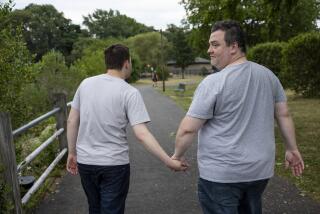In Choosing a Therapy, Think Science
- Share via
Another unvalidated, pop-psych therapy claims a life. Last year, 10-year-old Candace Newmaker died during a session of “rebirthing” therapy in Colorado. Candace was wrapped in a blanket to simulate the womb and surrounded by pillows. The therapists then pressed on the pillows to simulate “birth contractions” and told the girl to push her way out of the blanket over her head. Candace, who had been adopted four years earlier and had been treated for various psychological problems, lost consciousness and died.
Connell Watkins, an unlicensed social worker who operated the counseling center, and three of her employees were charged with reckless child abuse resulting in death. The child’s mother, Jeane Newmaker, was charged with negligent child abuse.
Were the techniques used by these therapists standard practice in psychotherapy? How is a lay person like Jeane Newmaker, who wanted to help her troubled child, supposed to know the difference between good therapy and bad?
First, testimonials are no guideline. No matter what kind of therapy is involved, clients are motivated to tell you it worked. Every kind of therapy, including rebirthing, produces enthusiastic testimonials. But testimonials are not scientific evidence of effectiveness. A therapy’s success could be the result of the placebo effect: The client’s anticipation of success and the buzz about a new “miracle” method might be the active ingredients rather than the therapy itself. And notice that you never hear testimonials from the people who dropped out, who weren’t helped or who got worse.
Yet many new therapies are promoted not by evidence of their effectiveness--as measured against control groups or other approaches--but by the claims of a charismatic leader and the praises of happy clients. The method is then endorsed by enthusiastic practitioners who have been “certified” in the method, usually by attending a weekend workshop promoted by the therapy’s founder. Most of these therapies are packaged and promoted with no scientific support at all. They are just someone’s idea of what sounds good, wrapped up in fancy psychobabble.
The public is largely unaware of the enormous schism that exists between the training of most psychotherapists today and that of psychological scientists. There is no agency or organization to protect people from ignorant or unscrupulous therapists. Anyone can call himself or herself a “psychotherapist” and set up any kind of program as “therapy.” (In contrast, a psychologist must have an advanced degree and be licensed.) Thousands of people get credentials as “experts” in various techniques and therapies--doing hypnosis or hypnotherapy, diagnosing child sexual abuse, doing addiction or “rage reduction” counseling--without learning the methods of science or even the basic research that has been done on these subjects.
For example, all of the basic assumptions of rebirthing therapy--that people can recover from trauma, insecure attachment or other psychological problems by reliving their births--are unsupported by the vast empirical research on infancy, attachment, memory and post-traumatic stress disorder.
Many well-tested therapies are available for treating psychological problems. Decades of controlled studies have found that behavior therapy or cognitive-behavior therapy are the treatments of choice for a wide array of problems, ranging from depression, anxiety, panic and obsessive-compulsive disorder to coping with chronic health problems and pain. Instead of encouraging people to simply ventilate their emotions, blame their childhoods or talk endlessly about their unhappiness, these approaches teach people how to change their own self-defeating beliefs and modify the behavior that is making them miserable.
And in the case of chronic family problems, such as the conflict between Jeane Newmaker and her adopted daughter, family or “systems” therapists can help both parties understand and change destructive patterns. But this process takes time; no quick fix or single emotional “catharsis” will provide lasting change.
Do behavioral or family therapies help everyone? Of course not. But they do no harm, whereas unvalidated psychotherapies and scientifically illiterate “experts” are causing enormous harm and sometimes death. The only way to halt these pernicious fads has been through malpractice suits, which is how the epidemics of “recovered memory therapy” and “multiple personality disorder” finally have been slowed.
This means that it is up to consumers to think critically in determining what kind of therapy and therapist might be best for their problems. Ask about the therapist’s training and credentials. Ask whether the therapy’s assumptions, methods and effectiveness have been objectively assessed--by something other than testimonials.






